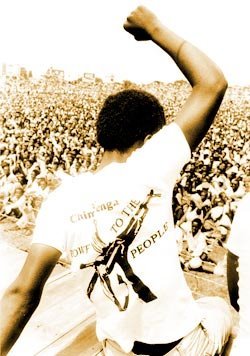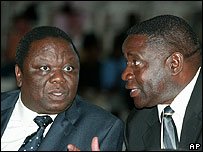
Broadcast on 15 May 2007
Violet Gonda: We welcome on the programme Hot Seat Moeletsi Mbeki a political analysts and brother to South African President Thabo Mbeki and Zimbabwe human rights lawyer and commentator Brian Kagoro. Welcome on the programme Hot Seat.
Moeletsi Mbeki: Thank you
Brian Kagoro: Thank you Violet.
Violet Gonda: Now I am going to start with Moeletsi Mbeki. Many believe that Africa is failing to do more about the crisis in Zimbabwe and Zimbabwe was t his week elected to Chair the UN Commission on Sustainable Development. But there has been an outcry by many who feel that Zimbabwe is completely unfit for this position and that it was the African bloc that pushed this recommendation. Now why is Africa not responding to the situation in your view?
Moeletsi Mbeki: Well I think the main reason; the main problem with Zimbabwe; why Africa is not responding; is actually Southern Africa. It’s not Africa in general. I know for a fact that many other parts of Africa especially West Africa disapprove very strongly of what the ZANU PF regime is doing in Zimbabwe. I have talked to several Presidents in West Africa and they don’t support what’s happening. The problem is that Southern African governments; who are themselves behind Robert Mugabe; one can say, behind ZANU PF, are the ones who are insisting that Zimbabwe must be put forward. If you recall; when there was an Organization of African Unity meeting; these issues were put to the background by the Southern Africa countries because if you remember there was a human rights report, which disapproved strongly of Zimbabwe. So it’s the Southern African countries rather than Africa as a whole.
Violet: Now Brian Kagoro do you agree with this? The Zimbabwean Government is responsible for major human rights abuses in the country, now why are the Southern African countries not criticizing the Mugabe regime?
Brian Kagoro: I think there are several factors. The first one is that Zimbabwe is, for most of them, not a foreign relations issue. It’s a domestic relations issue. If South Africa were to admit that Zimbabwe is guilty of the violations that we have all recounted time and time again, South Africa would have to change its policy on how it treats Zimbabwean immigrants. Especially the so-called illegal immigrants and asylum seekers in the country. It will have to stop detaining them like criminals as it does in several detention centers and deporting them, sending them back home. It would have to adopt a position consistent with an acknowledgment that there is political persecution of a certain group of citizens in Zimbabwe. So that domestic consideration affects, that’s one of them. There are economic and other factors that are linked to accepting that Zimbabwe is behaving like a rogue state. It would mean that domestically it would have to change how it structures its economic interactions in Harare; the sort of loans, soft loans, small loans, some medium size loans that are given to the Harare regime. So in a sense I think there is a huge domestic consideration because South Africa’s foreign policy indicates that it has to be motivated by considerations of human rights, consistent with the ANC Charter and its history of supporting democratic struggle and development.
And for Botswana a similar problem has arisen, one similar to Zimbabwe, in the sense that if Botswana were to condemn, it has in the past raised concerns about the influx of Zimbabwean immigrants. But, if it were to out rightly condemn the Harare regime of course this would not only harm the relationship between the two countries, but would also mean that there has to be a change internally. But, there are some sentimental issues that are not necessarily economic which are related to history. And the sentimental issues take several strands. The one is the suspicion that to condemn Mugabe would be to affirm Tsvangirai as the legitimate successor to the Zimbabwean President. And there are some in SADC; of course; whose views are that the MDC lacks depth to take over the country. That if it did so there would not be stability and that it will comprise the stability of the region. These are speculative reasonings that are not proven. But, amongst the security agencies of course the sort of spectre that is often dangled is that we saw Chiluba and the disastrous consequences for Zambia. And, that to have another Chiluba in Zimbabwe would be undesirable and of course the encouragement to labour-based opposition in South would be great as it would in other countries.
And, for Angola it is a totally different consideration. I am not sure that Angola would pride itself as being any different to Zimbabwe in terms of how it reacts and responds to way it treats the opposition. It’s not as blatant as Harare but certainly not one of the. And in other countries of course the Presidents are fairly new. Our colleagues in the Democratic Republic of Congo benefited largely from the largess and patronage of the Zimbabwean state.
Violet : Let me just go back to the issue of domestic consideration that Brian talked about. We know that there is a huge influx of Zimbabwean refugees fleeing to South Africa – about 40 000 a month and many of them are getting sent back, back to Zimbabwe. Now the South African government continues to ignore what’s happening next door. But an opposition official Roy Bennett was recently granted asylum in South Africa And, I understand he is the first senior opposition official to be given refugee status in South Africa. Moeletsi, does this mean South Africa is now acknowledging that there is political persecution in Zimbabwe?
Moeletsi Mbeki: Well the question of refugee status is a question that isgoverned in Africa by the OAU – now AU Refugee Convention. So there are a whole lot of conventions – the United Nations Convention, but above all the African Union and formerly the OAU’s own refugee convention. So there are agreements that you can recognize people as refugees and give them political asylum. So I think it’s under that context that Roy Bennett was given political asylum. But I just want to add to a point that Brian I think is overlooking. The reality is that the opposition in Zimbabwe is a very sophisticated opposition. Really the notion that it’s made up of unsophisticated people is not true. You have a huge number of NGOs supporting it, a number of academics, former ZANU PF supporters themselves, senior ZANU PF leaders, trade union leaders. So it’s a fallacy to say that MDC can’t run the country. MDC can run Zimbabwe better than ZANU PF, which has run the country to the ground.
I think several of the Southern African countries have opposition from the trade unions and from civil society in their own countries. Namibia for example has had opposition from its trade unions. Ben Mulenga the former President of the Namibia Mine Workers Union was one of the leaders of the opposition to SWAPO. So the question of Zimbabwe, of the MDC, is a real question its not speculation. The governments in region don’t want to encourage a new type of party that has the support of the large majority of the people whose primary programme is the welfare of the people rather than of a few nationalists leaders.
Violet: You know an ANC member was recently a guest on this programme and he said that the view in Africa is that the opposition is sponsored by the West and that they are puppets of the West. What are your thoughts on this?
Moeletsi Mbeki: Ah, this is a complete fallacy. The MDC is not a puppet of the West, was not set up by the West anymore than the ANC was set up by the West. The ANC got a lot of Western support. It got sanctions, it asked for sanctions from Western countries, from the United States Congress. And it got sanctions from Western countries that didn’t constitute the ANC being a puppet of the West, so that it is a fallacy that is being propagated by ZANU PF and its supporters in the region.
Violet: Now Brian given all these issues and by way of seeking solutions to the Zimbabwean crisis is SADC or the AU likely to be effective brokers of a peace deal?
Brian Kagoro: I think Moeletsi has indicated some of the dilemmas. Firstly their premise and judgment of the Zimbabwean opposition is totally misplaced. Secondly, a significant number of them fear ghosts in their own closets, skeletons in their own closets or fear that developments in Zimbabwe would replicate themselves within their own countries with the emergence of strong opposition and a social base. In my view there is a critical mass of African leaders who are not necessarily anti Mugabe or pro Tsvangirai but who are pro-democracy. Who I’d say are interested in the emergence of a new Africa with a new image and a way of doing things and are growing increasingly frustrated by the sort of reputation or reputational hazards that allowing a Zimbabwean type of reputation to persist would impose on the continent.
So I am not sure that SADC would necessarily be the best abiders for several reasons: That they have been mired in the politics that we both described – that is 1. No. 2 - none of them seems to have sufficient willpower or political clout to push Mugabe beyond the current position that he has adopted. Which is that the feud in Harare or the crisis in Zimbabwe is a bilateral feud between Harare and Whitehall and the British government. Perhaps his position will change now that Blair is gone. Before, SADC’s excuse for not acting was that the Zimbabwean crisis was anchored around the land issue but now that we witness human rights violations that are not related to the rest of the historical question of land in any remote way, I think that SADC no longer has any excuse. If you like ‘the emperor is without his clothes’ so to speak.
But is there political will? Is there political clout? I doubt that SADC – they will in closed-door sessions perhaps express concerns – but I doubt that they do have a strong, if you like, a strong man that will be able to reign in Zimbabwe. Are there interests on the African continent beyond SADC? Yes, I think there are several, there are many that will be interested in seeing a resolution to the Zimbabwean crisis because the crisis is not only political. I mean the political crisis has worsened other crisis like the structural and the economic crisis but the resolution of the political question is central to achieving stability and beginning to session some form of transition and then transformation in Zimbabwe. And I think that there is sufficient African leadership beyond SADC to be able to make it happen.
Within the AU we have seen positive signs from the Commission itself where it expressed concerns. But you know the restrains of diplomacy are such that once SADC has defined this as its turf and determined that it is going to do something, albeit inadequate, they have to await the outcome of that process. And of course if you are Zimbabwe who went through the Troika and another Troika and another Troika and the bilateral negotiations and all these collapsed and yet the crisis has persisted. So there would be frustrations if you are Zimbabwe. Generally I think there is a solution and that solution can be found in African leadership. But, the question is how do you then broker, how do you ensure that there are more genuine interlocutors actually are the ones who come into play as opposed to those who are interested in international public relations for Mr. Mugabe.
Violet: That’s what I actually wanted to find out and back to the issue of SADC and m y next question could be a difficult one for Moeletsi because President Thabo Mbeki is your brother. Now he was chosen by SADC leaders in March as mediator for the crisis in Zimbabwe. Do you think he is the best man for the job?
Moeletsi Mbeki: Well I can’t say whether he is the best man or not. The situation is that South Africa has been involved in the Zimbabwean crisis from the very beginning and to tell you the honest truth the ANC has been saying that Zimbabwe is a democratic country despite the fact that elections have been rigged in Zimbabwe. They have give a clean bill of health to the elections that were rigged in Zimbabwe so my own reading is not so much about this individual or that individual. The point is that Southern African countries don’t really want a replacement of Mugabe, they want a reformed ZANU PF to be put in place but they don’t want a free and fair election, which the MDC can win.
Violet: And you know Thabo Mbeki has received a lot of criticism for the way he is handling the Zimbabwe situation and I think at one point you were quoted saying South Africa's political elite is an obstacle in the quest to save Zimbabwe from collapsing. Now why did you say this?
Moeletsi Mbeki: No, No, No I never said that. It was the newspaper reporter who said that. I said Zimbabwe has become a Bantustan of South Africa and as a Bantustan of South Africa the economy of Zimbabwe is sustained by remittances from Zimbabweans who work in South Africa and which they send to their families and the goods that South African companies chasing after that money sent to Zimbabwe. That was my analysis the other one was by some journalist who wrote his own thing.
Violet: As a political analyst what advice would you give though to your brother in handling the Zimbabwe issue since he is the go-between, the one who is facilitating dialogue?
Moeletsi Mbeki: No, No my brother is President of South Africa. He has his advisers; he has his cabinet he doesn’t depend on family members for his advise. No I don’t give his er…
Violet: So you don’t talk about the Zimbabwe situation?
Moeletsi Mbeki: No the question of him being President of South Africa is not a family matter it’s a matter of democracy in South Africa. We will then emasculate our democracy if the family now becomes the ruler of South Africa. That’s not democracy.
Violet: Now moving on to what Zimbabweans can do about their situation. Brianw hat can people realistically do to deal with their predicament?
Brian Kagoro : I think there are things that can be done internally which are to continue to advocate and fight for their rights. I think that is a duty that every citizen in every country on the continent, particularly Zimbabweans wherever they are. But there are some practical issues. I think that the battle for Zimbabwe won’t be won in only one front. There are some who think that it can be won on the streets by a march to the State House. I am sad to say I don’t share that view. There are others who think it would be simply won at a negotiating table and knowing the history of ZANU, Mugabe – I don’t share that view in response to a constituency that is definable and defined that is powerful, it is assertive. There are others who think that the external interlocutors will actually resolve the internal crisis and as Moeletsi has already said they have their own strategic and other interests that there would be championing in the process. So my suggestions would be, perhaps, we have to think somewhat out of the box.
What are the key points of contention? There is the claim by ZANU of course that there are these sanctions against them and of course the counter by the opposition that these sanctions are necessary because you have behaved like a rogue state. You violate human rights and so in a sense ZANU’s current position is that it will not negotiate until the sanctions are removed. The opposition’s position as I understand it is that there are no sanctions against Zimbabwe. There are travel bans against ZANU PF officials many of whom have declared that they don’t want anything to do with the West anyway.
So here is the small question for me. If the opposition has no real stake in whether or not there are travel bans on ZANU PF, one way of upping the anti will be to suggest that ZANU PF should scrap repressive legislation, commit to the dismantling of the structural violence – the militia and this new type of abduction and murder of people. And, that in turn, those who have the capacity to suspend the travel bans should consider that as a quid pro quo and that if the commitments from either side are not met within a set period then of course you look at other alternatives. I think that the red herrings that have kept this negotiation from going, I don’t think the travel ban are doing any particular amazing work in keeping a democracy in Zimbabwe or restraining ZANU actions and that is the only premise that’s holding them. And of course we know this is just gamesmanship. But call their bluff in a sense. I am not sure that there would be anyone in the opposition who would want to stake their life on whether or not the travel ban stay or are removed. They are not a significant factor. For most people in Zimbabwe it would be not just economic normalization but the creation of a conducive environment, for political dialogue and discourse to happen, for citizens to exercise their rights. And this would mean dealing with the Access to Information and Protection of Privacy Act, dealing with the Public Order and Security Act - the legislation. But also dealing with the conduct and practice of violations.
So I would propose that for those; both the external actors as well as the internal actors; is that we call Mugabe’s bluff on this matter. Somebody has to demonstrate that they are playing games.
Violet: Do you agree with this Mr. Mbeki? Do you think that the targeted sanctions should be scrapped as a way of getting the Mugabe regime to the negotiating table?
Moeletsi Mbeki: Well it’s not up to us for non-Zimbabweans to specify how Zimbabweans should run their negotiations so…
Violet: At the SADC summit, the SADC leaders, that was one of the recommendations from the African leaders that perhaps the West should consider the issue of targeted sanctions.
Moeletsi Mbeki: Well I don’t know what the SADC states were going to put what pressure. They didn’t put an alternative pressure to the western sanctions. So I don’t see that as being serious proposals. But as I was saying it is up to the Zimbabweans to say what kind of sanctions should be put where, when and so on. We had the same situation in South Africa and we demanded comprehensive sanctions against the apartheid regime but it was us the South Africans who demanded that and we said we would live with the consequences of those sanctions. So it’s not for me or for us who are outsiders who are supporters of democracy in Zimbabwe to specify how the negotiation processes should happen.
Violet : You know it’s been said that only Zimbabweans can resolve their issue. Now I just wanted to get your views on this. What does it mean when people say that Zimbabweans need to do something about their situation. What exactly would they…
Moeletsi Mbeki: …No I disagree with that point of view. In our struggle in South Africa we had support from people from all over the world including Zimbabwe. We had support from the Zimbabweans, from Tanzanians, Zambians, Mozambicans, Americans, British, Swedes, Chinese. So we had support from all over the world. When you are fighting a dictator you need a lot of support. So I don’t accept the position that only Zimbabweans can resolve the issue. And as I pointed out in any case the government in Zimbabwe uses a whole lot of international mechanisms to support itself. So that point I don’t accept I think those of us who want to see peace and democracy in Zimbabwe have to support the peoples of Zimbabwe. The strategy obviously has to be developed by the Zimbabwean not by us. But the support, yes we have to carry on we cannot expect the unarmed innocent people of Zimbabwe to be able to get on top of a tyrant a brutal tyrant like the ZANU PF regime all on their own.
Violet: Ok and finally Brian Kagoro what role should Africa play in negotiating a solution to the Zimbabwean crisis in your view?
Brian Kagoro: I think Moeletsi has captured it well. There needs to be clear pressure and clear deliverables that they are demanding of their colleagues. I think it is insufficient to simply say let the Zimbabweans do something about it, as though to suggest that a regime that responses with violence to peaceful protests or even gatherings will accept the opposition coming to its doors to negotiate just like that. To even suggest, even remotely, that Zimbabweans should consider anything else other than a peaceful process that they have been engaged.
So my view is very simple and a straightforward one. Africa should put clear demands if they are going to make demands of the West around the sanctions they must make clear demands of Harare around creating the necessary conducive political environment. The scrapping of repressive legislation and also dismantling the infrastructure of violence and desisting from perpetrating or encouraging violence and in particular dealing with the political criminals that have been causing this violence. I think nothing has been expected of the Mugabe government and it is unacceptable. So I think there should be clear censure, clear pressure and a clear expression of the fact that people want African leadership and Africans aren’t happy with the descent of Zimbabwe. Not just economic descent but also the political descent that we witness. I think that ZANU caused it to itself. If it is to retain a legacy, a historical legacy, of having liberated the country it owes it to itself to ensure that the citizens have freedom, even freedom from their opponents. Ian Smith believed in democracy only for the white minority and not for the rest of the country and if ZANU is to adopt a similar position it is tragic and it is unfortunate.
Violet Gonda: Thank you very much Moeletsi Mbeki and Brian Kagoro.
Moeletsi Mbeki: Ok thank you
Brian Kagoro: Thanks Violet.
Comments and feedback can be emailed to violet@swradioafrica.com

![]() Zimfinalpush">@@@@@@@@@@@@@
Zimfinalpush">@@@@@@@@@@@@@



![]() Zimfinalpush">@@@@@@@@@@@@@
Zimfinalpush">@@@@@@@@@@@@@









